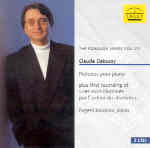A strong personality, intelligent musicianship, and supreme technical refinement grace Evgeni Koroliov’s previous Tacet releases devoted to music of Bach, Tchaikovsky, and Schubert. The same can be said for his Debussy Preludes, although some selections succeed more than others. In Book 1 much forethought and care seems to inform the weighing and timing of No. 1’s statuesque chords. No. 6 stands out for Koroliov’s staggering control of dynamics and sonority, with more attention to the left hand’s melodic contributions than we often hear. Indeed, such is the acuity of Koroliov’s ear that he manages to make the B-natural melody note in measure 20 sound utterly distinct from the C-flat that immediately follows, even though they’re one and the same note on the piano by virtue of equal temperament. No. 7’s whirling windstorm comes off with pulverizing brilliance.
While Preludes Nos. 1 and 3 in Book 2 are on the slow side, Koroliov’s painstaking textural differentiation rivets your attention. By contrast, the pianist’s decisive, angular approach to No. 9 points up the music as a harbinger of Prokofiev, sacrificing nothing in color and alluring nuance to the stinging clarity and scintillation he brings to Nos. 11 and 12.
Elsewhere, however, Koroliov convinces less. Book 1’s fourth piece is hampered by twitchy rubatos, while the pianist mauls the sensual triplet/duplet phrases in No. 5’s middle section beyond rhythmic comprehension. Likewise, No. 12’s gearshifts play total havoc with the music’s basic cakewalk pulse, and there’s little snap or lilt to No. 9’s guitar-like evocations. In Book 2 you could imagine Ondine (No. 8) with less abrupt mood shifts and more breathing room, along with a softer, more mysterious No. 7. Koroliov digs into No. 5’s strutting style with appropriate vigor and spunk, but his habit of rushing the crescendos ruins the specific rhythmic intent of Debussy’s two-bar molto-staccato lines, which are analogous to the “breaks” that early jazz masters like Jelly Roll Morton or King Oliver and Louis Armstrong held dear.
As a bonus, Koroliov includes the first recording of Les Soirs illuminés par l’ardeur du charbon, a composition discovered in 2001. It might be described as a terse first cousin to Book 1 No. 4, and Koroliov plays it beautifully. Sonically speaking, my taste in this repertoire leans toward a more robust, warmly detailed ambience (Arrau or Kocsis/Philips, Jacobs/Nonesuch) than Tacet’s slightly distant perspective.
































